He was born 28th May 1952 as 𝗝𝗲𝗮𝗻 𝗱𝗲 𝗗𝗶𝗲𝘂 𝗠𝗮𝗸𝗶𝗲𝘀𝗲 in Léopoldville (Currently Kinshasa), the capital City of Belgian Congo later Zaire(and now DRC) 𝗠𝗔𝗗𝗜𝗟𝗨 𝗦𝗬𝗦𝗧𝗘𝗠
𝗘𝗮𝗿𝗹𝘆 𝗟𝗶𝗳𝗲 & 𝗦𝘁𝗮𝗿𝘁 𝗼𝗳 𝗠𝘂𝘀𝗶𝗰 𝗝𝗼𝘂𝗿𝗻𝗲𝘆.
Jean de Dieu Makiese grew up a very active boy. During the 1960s when Jean came of age the city had a vibrant and highly competitive music scene.
In 1969, Jean Makiese joined a Rumba band called 𝐎𝐫𝐜𝐡. 𝐒𝐢𝐦𝐛𝐚 and spend the next few years honing skills in Papa Noel’s band 𝐁𝐚𝐦𝐛𝐨𝐮𝐥𝐚, 𝐅𝐞𝐬𝐭𝐢𝐯𝐚𝐥 𝐝𝐞 𝐌𝐚𝐪𝐮𝐢𝐬𝐚𝐫𝐝 (with Mangwana Sam), a n d in 1971 he joined 𝗙𝗮𝗴𝘂𝘀 𝗜𝘇𝗲𝗶𝗱𝗶’s band 𝐅𝐢𝐞𝐬𝐭𝐚 𝐏𝐨𝐩𝐮𝐥𝐚𝐫.
𝐓𝐇𝐄 𝐍𝐀𝐌𝐄 𝐌𝐀𝐃𝐈𝐋𝐔
When Fagus Izeidi formed Fiesta Popular in 1971 he recruited Johnny alias 𝗣𝗶𝗻𝗱𝘂, a young guitarist 𝗖𝗼𝘀𝗺𝗼𝘀, 𝗠𝗮𝗳𝘂, 𝗬𝗼𝘀𝘀𝗮 𝗧𝗮𝗹𝘂𝗸𝗶 & one of the musicians suggested to him (Fagus) one of his friends, 𝗝𝗲𝗮𝗻 𝗕𝗶𝗮𝗹𝘂, a young singer who lived in Kimbanseke.
He had to go and get him by car, in this lost corner of Kinshasa. In order to have him close at hand for rehearsals, Fagus had set up a room for him at his house in Renkin.
Very quickly, this little one who came out of nowhere became the darling of all the girls in the neighborhood. His first love as a musician of Fiesta Populaire, in this so-called “lights” district that was Matonge, was Bibi, Fagu’s neighbor’s daughter.
Fagus wanted to find a stage name for 𝐉𝐞𝐚𝐧 𝐁𝐢𝐚𝐥𝐮. James Brown was at the top of all the charts. As his name was 𝗝𝗲𝗮𝗻, he had offered to transform him into 𝗝𝗮𝗺𝗲𝘀. Fagus had also added a pseudonym that he had found in the dictionary: 𝗠𝗮𝗱𝗵𝗶 which means great magician in India.
So he was going to be called 𝗝𝗮𝗺𝗲𝘀 𝗠𝗮𝗱𝗵𝗶. But Jean was not satisfied. Wanting to create another, he added to Madhi, the last syllable “𝗹𝘂” of his own name. But Jean not being the champion of spelling, wrote Madhi without the letter “𝗵”, which gave 𝗠𝗮𝗱𝗶, to which he added the syllable “𝗹𝘂”. He had just created one of the big names in Congolese song: 𝗠𝗮𝗱𝗶𝗹𝘂, the future “𝗚𝗿𝗲𝗮𝘁 𝗡𝗶𝗻𝗷𝗮”
𝐌𝐚𝐝𝐢𝐥𝐮 𝐖𝐢𝐭𝐡 𝐎𝐫𝐜𝐡. 𝐌𝐀𝐘𝐎𝐏𝐈 (1973 – 1976)
In 1973, the n e w l y c h r istened “Bialu” under President Mobutu’s “authenticité” programme, Madilu alongside 𝗬𝗼𝘀𝘀𝗮 𝗧𝗮𝗹𝘂𝗸𝗶 & 𝗣𝗶𝗿𝗲𝘀 left 𝗙𝗶𝗲𝘀𝘁𝗮 𝗣𝗼𝗽𝘂𝗹𝗮𝗿 of Fagus and formed the band 𝐁𝐀𝐊𝐔𝐁𝐀 𝐌𝐀𝐘𝐎𝐏𝐈.
“Mayopi” is a nonsense word derived from the first two letters of each of their names. Though never exactly major players, they scored a significant hit with the song “𝑷𝒂𝒎𝒃𝒂-𝑷𝒂𝒎𝒃𝒂” in 1976.
𝐌𝐚𝐝𝐢𝐥𝐮 𝐖𝐢𝐭𝐡 𝐎𝐫𝐜𝐡. 𝐏𝐚𝐦𝐛𝐚 𝐏𝐚𝐦𝐛𝐚
(This part many will not tell you)
In 1976, Bialu left Bakuba Mayopi, forming his own group with 𝗦𝗼𝗸𝗶 𝗩𝗮𝗻𝗴𝘂 which they called 𝐎𝐫𝐜𝐡. 𝐏𝐚𝐦𝐛𝐚 𝐏𝐚𝐦𝐛𝐚. However, they met with no success in two years and Bialu had to leave to join 𝐀𝐟𝐫𝐢𝐬𝐚 of 𝗧𝗮𝗯𝘂 𝗟𝗲𝘆 in 1978 where he spend the last two years of the 1970s.
𝐈𝐧 𝐀𝐟𝐫𝐢𝐬𝐚 (1978 -1980)
In 1978 Madilu joined Africa and he had a very low-career point in Ley’s team for the two years he was with Ley. And this led to his betrayal by his master at Ndjili Airport.
𝐁𝐞𝐭𝐫𝐚𝐲𝐚𝐥 𝐁𝐲 𝐇𝐢𝐬 𝐌𝐚𝐬𝐭𝐞𝐫 𝐓𝐚𝐛𝐮 𝐋𝐞𝐲
Tabu Ley’s Afrisa band was invited for a concert in Europe in 1980. At this time, Madilu System was his singer but struggling in Ley’s shadow. Madilu was to show up at Ndjili airport the next day so they travel together. Madilu did not sleep a wink. It was going to be his first time to go to Europe. He arrived at Ndjili and waited for Ley. He waited long and hard. The flight they were to board was closing the gates and Madilu still did not see his boss. Madilu watched the aircraft ascend to the air leaving him behind. Rochereau had lied, tricked him, and left him destitute😭😭😭
𝐌𝐚𝐝𝐢𝐥𝐮’𝐬 𝐋𝐢𝐟𝐞 & 𝐋𝐞𝐠𝐚𝐜𝐲 𝐈𝐧 𝐓𝐏 𝐎𝐊 𝐉𝐚𝐳𝐳 (𝐋𝐈𝐆𝐇𝐓 𝐈𝐍 𝐇𝐈𝐒 𝐏𝐀𝐓𝐇𝐒 𝐄𝐌𝐄𝐑𝐆𝐄)
After his unceremonious departure from Tabu Ley’s Afrisa, Madilu System joined TPOK Jazz in April 1980. This happened after he was introduced to Franco by Ntesa Dalienst who at the time was a stalwart singer and composer in TPOK Jazz.
For the first three years in TPOK Jazz, Madilu was virtually unknown. He played an insignificant role within the band, appearing mostly as a backup singer in concerts. His voice was not heard on any TPOK Jazz songs between 1980 to 1983. In Madilu’s own words, Franco never respected him and never rated him highly as a singer.
But all this would change dramatically in 1983. Franco would compose a song called “Non”. It was a highly controversial song in which Franco yet again sought to blame women for a myriad of problems that occur in marriages. Franco had been critical of women in the past but this song went as far as being mean spirited.
Five years earlier, Franco had landed in hot soup with the authorities when he sung two controversial songs named “Helene” and “Jacky”. The songs criticized two women, going into graphic detail about their lack of hygiene. The then Attorney General jailed Franco and all the musicians who had sung the two songs at the notorious Makala prison.
As a result, when it was time to sing “Non”, many musicians were reluctant to participate in the song for fear of running afoul of the law and ending up at Makala prison again. In particular, Franco wanted Josky Kiambukuta or Ntesa Dalienst to be the lead singer on the song. Both declined.
Madilu says that while on tour in Europe, he met Franco in the corridors of the hotel where they were staying. Franco informed Madilu that he was working on a new song called “Non” and was looking for a singer to perform the lead vocals.
He then asked Madilu to go upstairs with him for an impromptu recording session. Madilu sung the written lyrics into a cassette tape. When Franco replayed the tape, he was thoroughly impressed with Madilu’s vocal skills. He wondered how such a vocal talent had been in his band for three years and he did not know it. Franco’s wife, Annie Mbule who was also in the hotel wondered how Madilu, whom Franco always claimed could not sing, had suddenly developed a marvelous singing voice.
𝐀𝐟𝐭𝐞𝐫 𝐅𝐫𝐚𝐧𝐜𝐨’𝐬 𝐃𝐞𝐚𝐭𝐡 & 𝐅𝐢𝐧𝐚𝐥𝐥𝐲 𝐒𝐨𝐥𝐨 𝐂𝐚𝐫𝐞𝐞𝐫
Franco’s death in 1989 – most probably thought be from an Aids-related condition – was a body blow from which TPOK Jazz never recovered, although they continued to perform to considerable acclaim, appearing in London the same year. Under pressure from Franco’s family to relinquish the name, the poet Simaro formed Bana OK (“Children of OK Jazz”) in Kinshasa at the start of 1994, taking most members of TPOK Jazz with him – except Madilu System, who resolved to start a solo career.
Basing himself in Geneva, (he had married a Swiss woman in 1985 under controversial circumstances) Madilu System divided his time between there, Paris and Kinshasa, working mostly with expatriot Congolese musicians to perpetuate Franco’s classic “odemba” style of rumba on a series of solo albums, backed variously by the bands Multi-Système, OK Système and Tout Puissant Système. These began in 1994 with the zouk-flavoured Sans Commentaire. Subsequent solo releases included Album ’95 (1995), L’eau (1999), Pouvoir (2000), Tenant du Titre (2003), Bonheur (2004) and most recently Le Bonne Humeur (2007).
During this solo phase, he collaborated on albums with other Congolese musicians, including former Choc Stars’ singer Debaba Mbaki, Nyboma (of Kékélé), Benz-Petrole, Ndombe Opetum, Lokassa ya Mbongo, Rigo Star and Josky. He also occasionally participated in Dizzy Mandjeku’s long-running homage project Odemba OK Jazz All Stars, although commitments in Kinshasa meant he was unable to make their UK début in May this year.
In 2006, he recorded a reprise of “Mario” on the album Ketukuba by the Afro-salsa supergroup Africando.
𝐃𝐞𝐚𝐭𝐡
Legendary Congolese singer Madilu System passed away at age 57 on Saturday, August 11, 2007 in Kinshasa leaving behind four known children. He was among the kingpins of the legendary TP OK Jazz band of the late Franco Luambo Makiadi in the 1980’s. And at the time of his death, was in the process of making another album with the producer Ibrahima Sylla.
𝐌𝐚𝐲 𝐇𝐢𝐬 𝐒𝐨𝐮𝐥 𝐑𝐞𝐬𝐭 𝐈𝐧 𝐄𝐭𝐞𝐫𝐧𝐚𝐥 𝐏𝐞𝐚𝐜𝐞
𝐑✞︎𝐈✞︎𝐏




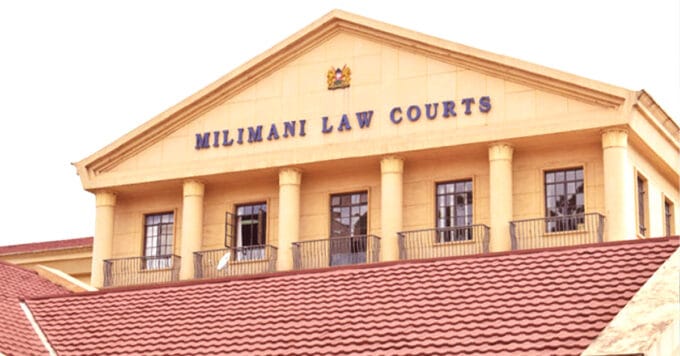

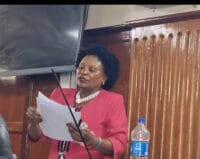


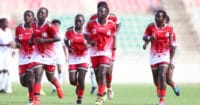



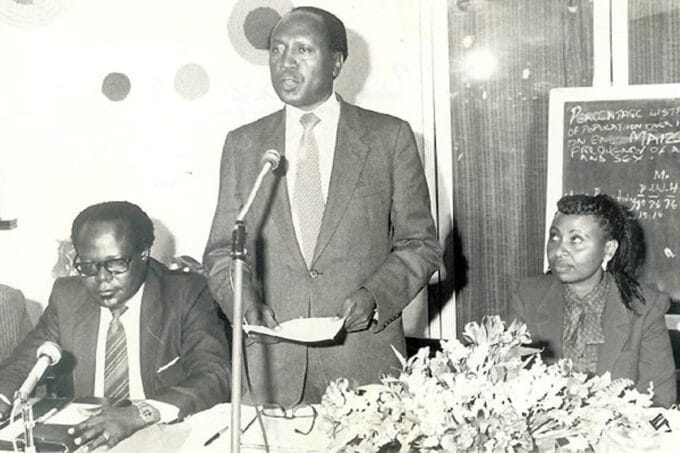
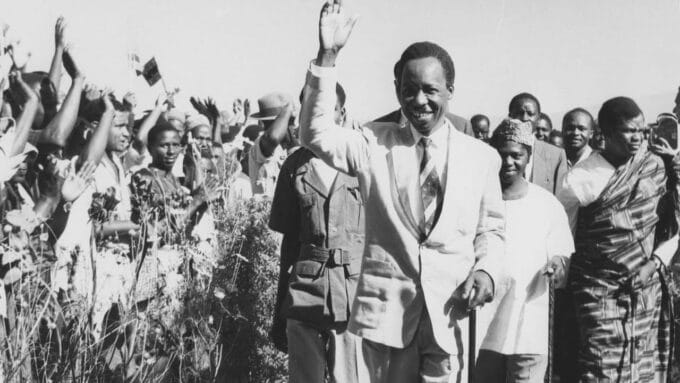




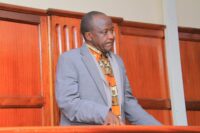
Leave a comment